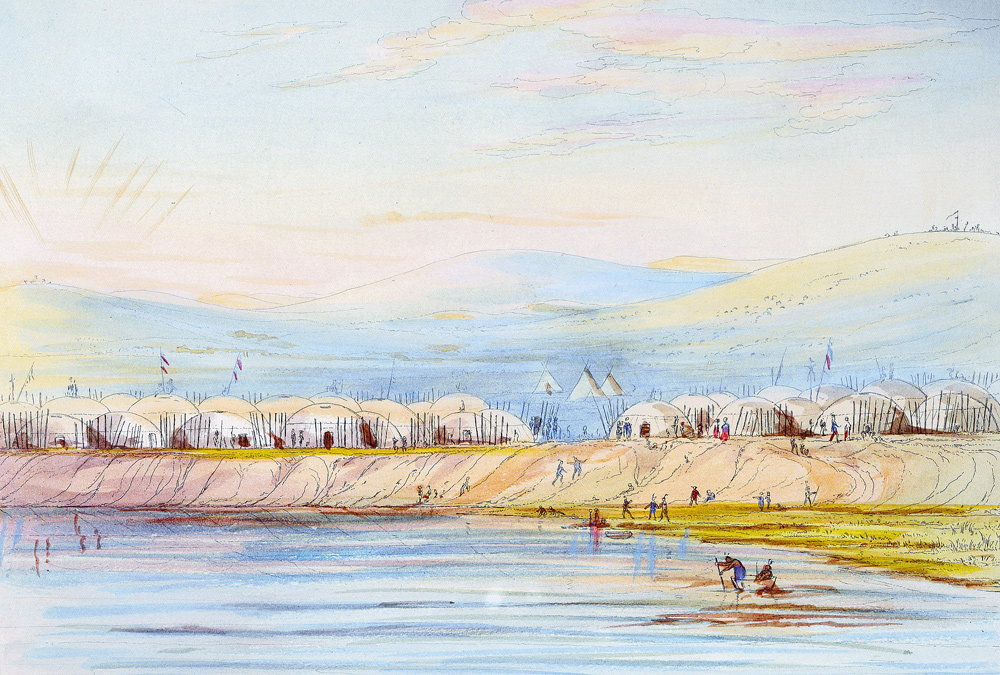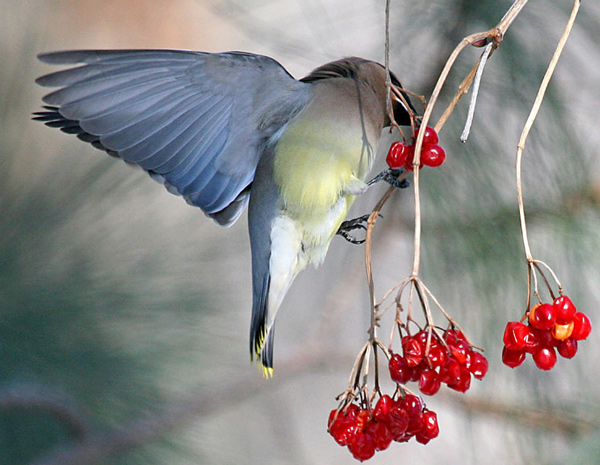Some visiting Mandans tell the captains that the entire Arikara nation has moved to one of their old villages nearby. The captains decide to postpone leaving Fort Mandan to learn more.
An Arikara Farewell
by Yellowstone Public Radio[1]Originally aired weekdays by Yellowstone Public Radio during the Bicentennial observance of 2003-2006. Narrated by Hal Hansen. Scripts by Whit Hansen and Ed Jacobson. Produced by Leni Holliman. © … Continue reading
Arikara Village of Earth-Covered Lodges, 1600 Miles above St. Louis
George Catlin (1796–1872)
Letters and Notes, Plate 80. Hand colored. Courtesy Missouri Historical Society, mohistory.org/collections/item/N27615.[2]Original sketch from George Catlin, Letters and Notes on the Manners, Customs, and Condition of the American Indians, (London: 1841), vol. 1, plate 80.
Regarding the Arikara village shown above, George Catlin wrote:
This village is built upon an open prairie, and the gracefully undulating hills that rise in the distance behind it are everywhere covered with a verdant green turf, without a tree or a bush anywhere to be seen. This view was taken from the deck of the steamer when I was on my way up the river.
When Lewis and Clarke first visited these people thirty years since, it will be found by a reference to their history, that the Riccarees received and treated them with great kindness and hospitality ; but owing to the system of trade, and the manner in which it has been conducted in this country, they have been inflicted with real or imaginary abuses, of which they are themselves, and the fur traders, the best judges ; and for which-they are now harbouring the most inveterate feelings towards the whole civilized race.[3]Ibid., 204.
Arikara Migration
we are informed of the arrival of the whole of the ricarra [Arikara] nation on the other Side of the river near their old village. we Sent an interpreter to See with orders to return imediately and let us know if their Chiefs ment to go down to See their great father.
—William Clark
A Diplomatic Delay
our officers wished to wait and know their business, as the indians sayed that they were near this on the opposite Side of the River. So our Intrepeter [Joseph Gravelines] one of the party and two frenchmen was Sent across the River in order to go & See if the report was true.
—John Ordway
Weather Diary
State of Thermometer at rise
Weather Wind at rise
State of Thermometer at 4 P.M. Weather Wind at 4 P.M. State of the River 19 [above 0] fair N. 48 [above 0] cloudy N. W. fallen 1 in.
This day a flock of cherry or cedar birds [Cedar Waxwing] were seen, one of the men killed, several of them which gave me an opportunity of examining them. they are common in the United States; usually ascociate in large flocks and are frequently distructive to the chery orchards, and in winter in the lower parts of the states of Virginia & Maryland feed on the buries of the Cedar. they are a small bluish brown bird, crested with a tuft of dark brown feathers with a narrow black stripe passing on each side of the head underneath the eye from the base of the upper beak to the back of the head. it is distinguished more particularly by some of the shorter feathers of the wing, which are tiped with a red spots that have much the appearance at a little distance of sealing wax. all the birds that we believe visit this country have now returned.—
—William Clark and Meriwether Lewis[4]To assist the reader, the editor of this web page has omitted the date column, clarified the “State of the River” information, and spelled out some abbreviations.
Fort Mandan is a High Potential Historic Site along the Lewis and Clark National Historic Trail managed by the U.S. National Park Service. The North Dakota Department of Parks and Recreation manages a modern reconstruction and the Lewis and Clark Interpretive Center located at US Hwy 83 and ND Hwy 200A.
Knife River Indian Villages National Historic Site is a High Potential Historic Site along the Lewis and Clark National Historic Trail managed by the U.S. National Park Service. A unit of the National Park System, the site is located at 564 County Road 37, one-half mile north of Stanton, North Dakota. It has exhibits, trails, and a visitor center.
Notes
| ↑1 | Originally aired weekdays by Yellowstone Public Radio during the Bicentennial observance of 2003-2006. Narrated by Hal Hansen. Scripts by Whit Hansen and Ed Jacobson. Produced by Leni Holliman. © 2003 by Yellowstone Public Radio. |
|---|---|
| ↑2 | Original sketch from George Catlin, Letters and Notes on the Manners, Customs, and Condition of the American Indians, (London: 1841), vol. 1, plate 80. |
| ↑3 | Ibid., 204. |
| ↑4 | To assist the reader, the editor of this web page has omitted the date column, clarified the “State of the River” information, and spelled out some abbreviations. |




